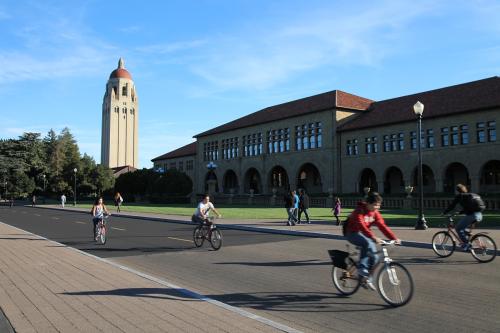(单词翻译:单击)
听力文本
Today's we are going to school on 'Words to the Wise.' I'm Caty Weaver. Here with me in the Learning English studio is Pete Musto. Hi Pete!
Hi Caty. So, we got a comment on an earlier Words to the Wise program from Ahmed. He wrote: "Thank you very much for your help. I would like you to talk about curriculum and tertiary education." So, that's why we're going to school today.
That's right. And that's why it's great you are here, Pete. Pete is an education reporter for Learning English. And he is quite the scholar when it comes to university education issues.

Well, that's kind of you to say, Caty. So, I guess scholar can be our first education word to define. Uh huh. A scholar is a person who has studied a subject a lot and is knowledge about it as a result.
The adjectival form is scholarly. People often call research publications, scholarly journals. The Journal of American Medicine is a famous one. Experts usually write the pieces found in scholarly publications. And sometimes these experts are university professors. Now, we all know what a professor is, but there are kind of professors that confuse me. What is an adjunct professor, Pete? And, is it the same as an associate professor?
No, no, no. Adjunct mostly means part time, with no permanent tie to the college or university. The adjunct professor usually teaches just one or two classes. The teaching agreement with the school is often made individually for each course.
Oh, OK. So, an associate professor has a permanent position. These are full-time professors, and together, professors and teaching staff, make up what's called the faculty.
That's right.
So professors usually have tenure. I think that's another term we should explain, right Pete? Tenure is something professors can earn over time, right?
Oh yes. And it is important. It means permanent employment with a university. It usually provides the teacher with strong protection against dismissal. But, it's mostly common in the United States. Professors in other countries don't really have tenure.
And, of course, the word tenure is not only used for academic settings. Your tenure at a job, for example, refers to your period of service. But, when most people hear the word, they think of higher education, or what our friend Ahmed called "tertiary education." Tertiary comes from the Latin, right -- for three or third?
That's right. So, university is the third part of a person's formal education. First, there is primary school, then secondary school and, finally, higher education or tertiary education.
Ahmed also used the term curriculum. Some English learners may not be familiar with that word. Curriculum is the program of study for a subject. The program of study will include many different courses.
Right. A course is a series of classes on a subject. For example if you seek a degree in psychology, your curriculum might require courses in human behavior, personality development and cognitive psychology.
So, psychology sounds like an interesting major. A major is what we call the central academic subject of your college studies. So schools usually require students to declare their major by the end of their second year.
You are able to change your major at most universities in the United States at any point. Sometimes it can be a really good idea.
Absolutely.
So, does all this tertiary education talk make you wish you were back on a college campus, Caty?
If you mean walking around a beautiful university's grounds... sure! But I can do without the homework, tests and papers!
Yeah, I agree with you. I think I'll just stick to academic vocabulary for now. Maybe we could even do another education Words to the Wise soon.
To be sure... many more words to cover. And we'd love for our fans to keep posting messages about what subjects they'd like to hear about.
A big thanks to Ahmed!
I'm Caty Weaver.
And I'm Pete Musto.
重点解析
1.when it comes to 一谈到;当提到;当谈到
They are inexperienced when it comes to decorating
说到装修,他们就没有什么经验了。
2.permanent employment 永久工作;固定工作
She is looking for permanent employment.
她正在找固定的工作。
3.stick to 紧随;紧跟;呆在······近旁;坚持不变;遵守,坚持(诺言、协议、决定、原则等);遵循(规则)
Perhaps he should have stuck to writing.
也许他还是一心放在写作上来得保险。
参考译文
我们今天的《睿智之言》和校园相关。我是卡蒂·韦弗。和我一起在学英语演播室的还有皮特·穆斯托。嗨,皮特。
嗨,卡蒂。我们之前的《《睿智之言》》有一个来自艾哈迈德的留言。他写道:“谢谢你们的帮助。我想听你们谈论关于课程安排(curriculum)和高等教育(tertiary education)的话题。”所以,这就是我们今天要讲校园话题的原因。
是的。那也是你在这里太好了的原因,皮特。皮特是学英语的教育记者。在大学教育问题方面,他颇有学者(scholar)范。
嗯,你真是太客气了,卡蒂。那么,我想“scholar(学者)”将是我们要解释的第一个教育类单词。嗯。学者是指对于一个学科研究得很多,因此对这个学科也很了解的那类人。
“scholar(学者)”的形容词是“scholarly”(学术的)。人们经常称呼研究类出版物为学术期刊(scholarly journals)。《美国医学杂志》就是著名的学术期刊。专家们经常在学术类出版物上发表文章。有时候这些专家是大学教授(university professors)。我们都知道什么是教授,但是有种教授让我很不解。“adjunct professor(兼职教授)”是什么教授,皮特?它和associate professor(副教授)是一回事吗?
不,不,不一样的。“Adjunct”主要指兼职,与学院或大学没有永久联系。兼职教授一般只教一两个班。与学校的教学协议通常是针对每门课程单独制定的。
哦,好的。那么副教授是有稳定的职位的。副教授是全职教授,而且,教授和教职员工组成了全体教职员(faculty)。
对的。
所以,教授通常是终身制(tenure)的。我想这是另一个我们应该解释的术语,对吗,皮特?终身职位是教授可以随着时间的推移而得到的。对吗?
是的。这很重要。这意味着和学校的永久聘用关系。它强有力地保障了教师免于被解雇。但是,教授终身制在美国很普遍。在其他国家,教授实际上没有终身制。
当然,“tenure”这个单词不仅仅适用于学术背景。例如,你的工作任期(tenure)指的是你的在职时间。但是,大部分人听到这个词会想到高等教育(higher education),或者我们的朋友艾哈迈德说的“tertiary education(高等教育)”。“Tertiary(第三的)”来源于拉丁语,正好是三或者第三?
对。那大学是一个人正规教育的第三阶段。第一阶段是小学(primary school),然后是中学(secondary school),最后,接受高等教育(higher education或tertiary education)。
艾哈迈德也用了“curriculum(课程安排)”这个术语。一些英语学习者可能对这个单词不熟悉。课程是一门学科的学习计划(program of study)。学习计划会包括许多不同的课程(courses)。
是的。课程值得是一门学科的一系列课。例如,如果你想要得到心理学(psychology)学位(degree),你的课程安排也许包括行为科学,人格心理学和认知发展方面的课程。
心理学听起来像一个有趣的专业(major)。“major”说的是大学期间的主修科目。所以学校通常会要求学生在大二学年结束的时候决定他们的专业。
你可以在美国大学阶段的任何时候改变你的专业。有时候这真的是一个好主意。
当然。
那么,所有这些关于高等教育的话题让你想重回校园了吗,卡蒂?
如果你的意思是在一个美丽的大学操场转转的话,当然!但如果没有作业,测试和考试我可以回学校!
是的,我赞同你说的。我想我现在还是坚持学习词汇吧。也许我们可以很快做另一期关于教育的《睿智之言》。
为了能涉猎更多的单词。我们希望我们的听众继续给我们留言反馈他们想听到的学科。
非常感谢艾哈迈德!
我是卡蒂·韦弗。
我是皮特·穆斯托。


